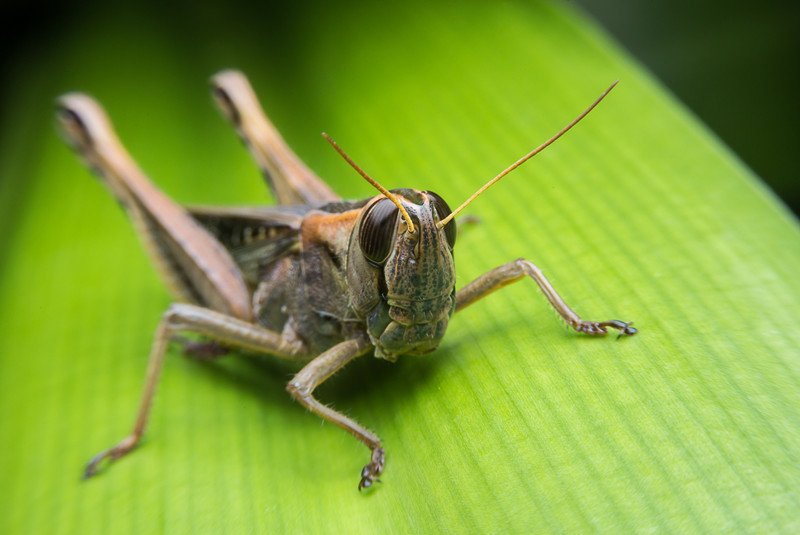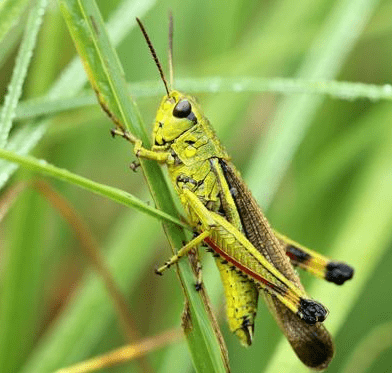How Much Do Grasshoppers Weigh
Did you know that grasshoppers are one of the most fascinating insects in the world? They are known for their incredible jumping ability, long antennae, and amazing camouflage skills. But have you ever wondered how much they weigh? In this article, we will answer the question, "How much do grasshoppers weigh?" and explore the world of grasshoppers.
The Pain Points of Grasshopper Weight
For those in agriculture, grasshoppers can be a significant pest issue, with some species capable of causing destruction to crops and livestock feed. Farmers also need to know the weight of these insects to determine the appropriate amount of pesticide to use safely.
Answering the Question: How Much Do Grasshoppers Weigh?
Grasshoppers typically weigh between 0.1 and 3.5 ounces, depending on the species. The smallest grasshopper species can weigh as little as 0.003 ounces, and the largest species can weigh up to 0.7 ounces. However, the weight of grasshoppers varies based on their age and diet, with the heaviest ones being the most well-nourished and matured.
Summary of Main Points
From understanding the weight of grasshoppers to their importance in agriculture, grasshoppers are fascinating creatures with a lot to learn. Moreover, their weights can vary due to different factors such as age and diet.
Exploring How Grasshoppers Weigh Affects Ecology
When I was a kid, I had a friend who raised grasshoppers. She would prepare small boxes full of dirt and leaves, and occasionally, she would bring them over to show me how big they had gotten. It was always a surprise to see how fast they had grown and how much they had weighed.
The weight of a grasshopper is essential to its survival in the wild. A healthy grasshopper with an appropriate weight can escape from predators quickly and with ease, whereas an overweight grasshopper is more likely to become prey and an underweight one may fall from its perches.
Why It's Important to Know the Grasshopper Weight
In agriculture, farmers need to know the weight of grasshoppers to determine the appropriate amount of pesticide to use safely while weighing within the diet requirements of the grasshoppers.
The Effects of Grasshopper Weight on Agriculture
As grasshoppers feed on crops and livestock, they can cause significant losses to farmers. Pesticides can help control their population, and knowing their weight is key to ensuring effective pest control without harming the grasshopper's diet. Therefore, to understand how to manage grasshopper populations successfully, farmers must measure their weight.
A Closer Look at How Grasshopper Weight Affects Farming
When I first started working in the agriculture industry, I had no idea how important grasshoppers were to maintaining healthy crops. However, as I gained more experience, I realized the critical role that these insects play in agriculture.
Grasshoppers are essential because they are a natural form of pest control. They feed on weeds and can help to control various crop pests, such as aphids and spider mites. Therefore, controlling grasshopper populations is essential to preventing significant crop losses.
The Importance of Measuring Grasshopper Weight in Agriculture
As mentioned before, knowing the weight of grasshoppers is essential in determining the appropriate amount of pesticide to use effectively. Pesticides can be harmful to the environment and human health, so it is crucial to measure the weight of grasshoppers precisely. This knowledge will improve the management of grasshopper populations, maintaining crop growth, and food sustainability.
The Role of Farming on Grasshopper Weight
Farmers play a critical role in the weight of grasshoppers. Overfeeding livestock or crops can attract grasshoppers, but a long-term experience in farming integrates innovative grazing and growing approaches that become more attractive to pests like grasshoppers, which can quickly affect their weights.
Question and Answer:
Q1: How do I weigh a grasshopper?
A1: You can weigh grasshopper with a simple gram-weighing tool. Once you have captured the grasshopper, gently place it on the scale, and the weight will display.
Q2: Can the weight of grasshoppers vary?
A2: Yes. The weight of grasshoppers varies based on their age and diet and also can vary depending on their species.
Q3: How important is grasshopper weight in pest control?
A3: Grasshopper weights are essential when determining the amount of pesticide to use. Pesticides can help control their population, and knowing their weight is key to ensuring effective pest control without harming the grasshopper's diet.
Q4: What is the heaviest grasshopper weight on record?
A4: Schistocerca gregaria or the desert locust, has been recorded to weigh up to 2.3 ounces.
Conclusion
Understanding the weight of grasshoppers has significant implications in multiple aspects and interests. From agriculture to ecology and science, every piece of knowledge contributes to the better understanding of this infamous hopping insect. For all the farmers out there, know your grasshoppers, manage the population, and use pesticides that are efficient and safe for you, your crops, and the grasshoppers.
Gallery
How Long Do Grasshoppers Live? – WhatBugIsThat

Photo Credit by: bing.com / grasshoppers becoming
Do Grasshoppers Have Teeth? - James Collins Photography

Photo Credit by: bing.com / grasshoppers grasshopper
Why Taller Grass Can Be Bad News For Grasshoppers : The Salt : NPR

Photo Credit by: bing.com / grasshopper grasshoppers cricket sauterelle saltamontes bugs npr crickets pests insectes cavalletta orthoptera beelden havana nutrient decline deficient gafanhotos insecte grillon
Grasshopper: Basic Facts And Natural Ways To Get Rid Of Them - Pest Wiki

Photo Credit by: bing.com / grasshoppers grasshopper insects aids crickets cricket mouthparts bite
Do Grasshoppers Bite? How To Get Rid Of Grasshoppers - LawnsBesty

Photo Credit by: bing.com / grasshoppers capjournal